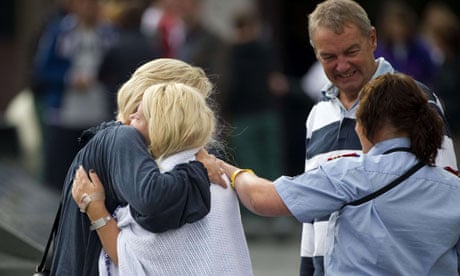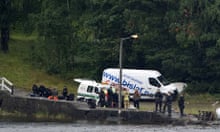At first I thought it was a blast from the construction work going on underneath my newspaper's office building in central Oslo. It was not. It was the sound of Norway losing its innocence.
Nothing characterises Norway as much as a deeply imbued sense of safety and security. On Friday afternoon this feeling of safety was changed by a powerful car bomb exploding in the heart of the Norwegian government buildings, killing at least seven, and the massacre of close to 100 young Labour party supporters, many of them teenagers.
The events of this weekend have given many Norwegians a sense of alienation towards their country. We have lost that feeling of safe and secure normality that Norwegians are so predisposed to take for granted. As the prime minister, Jens Stoltenberg, remarked in a speech yesterday, the island – which he had visited every summer since 1974, hosting the summer camps – had suddenly changed from paradise to hell. And so many of us are afraid that the events of Friday could change Norway forever, characterised as it is by a high degree of openness and egalitarianism.
It is not unusual to meet cabinet ministers accidentally on the street, or our foremost celebrities in grocery stores. A sort of charming naivety has been our hallmark, combined with a considerable degree of homogeneity.
Of course, Norway has its tensions too, and one of the very strongest is the challenges and problems of adapting to a multicultural society.
In earlier decades we had an inability to face some of the huge problems of integration. Today I think making the integration successes visible is a larger challenge.
As culture and op-ed editor of Norway's major newspaper, every week I read contributions which are rhetorically and politically not too unlike the blog posts written by the 32-year-old man who is now in custody, charged with the bomb explosion and the massacre. These articles more often than not contain extremely strong accusations against the political establishment and the media – for tearing our society apart and destroying Norwegian values and society as they knew them.
There is an undercurrent of anti-Muslim attitudes in Norway, accompanied by a fear of Islamic fundamentalist terrorism. And Norway's involvement in Afghanistan, and also some media's printing of the Mohammed cartoons, has resulted in severe threats against this country from terrorist networks. Of course, we have known that terrorism could happen here, but when it did it was not in the way we had expected. It was no act of violence orchestrated in the Middle East but by an Aryan-looking ethnic Norwegian describing himself as a Christian nationalist whose aim was to try to undermine multicultural Norway.
I deeply believe in a rational society that tries to solve its gravest problems through a free and open discourse with very few taboos, and where there exists a fundamental difference between word and action, and therefore the obligation to keep speech and thought as free as possible. Acts of terror do not respect that difference, but want to erase it.
The terrorist loner (if he was acting alone) has shown Norway the immense costs of being a touchingly open society. The Labour party's youth organisation has already decided to return to the island and win back the future that a terrorist intended to turn into past.
But I can't get rid of the sense that the cracking of machine-gun fire that ended almost 100 young and political lives was also the sound of fundamental change.
Knut Olav Åmås is the culture and op-ed editor at Aftenposten, Norway's leading newspaper.





